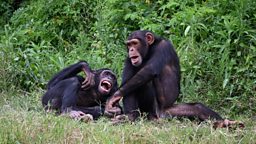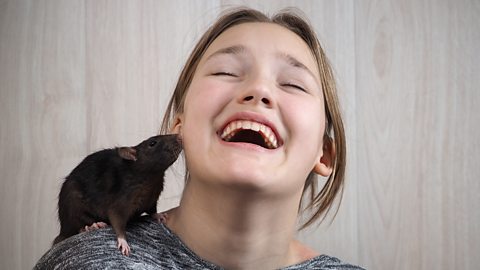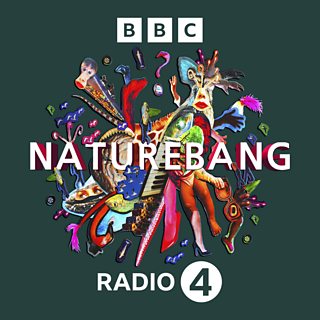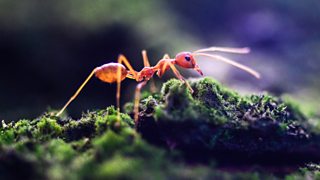Is the animal kingdom having a laugh?
What do the giggles and guffaws of animals tell us about human laughter?
Turning to the animal kingdom can help us answer some of life's big questions. In ����ý Radio 4's Naturebang, presenters Becky Ripley and Emily Knight look to the natural world to learn more about what makes us human.
In this episode, Becky and Emily are laughing it up - why do we make this strange noise? Professor Sophie Scott, the Director of the Institute for Cognitive Neuroscience at UCL, has found that human laughter isn't solely a joyous sound. Laughter can be deceptive, playing a crucial role in building bonds with other people or, in fact, breaking them. And all of this tracks back to our animal ancestors mucking about.
Here are eight findings about laughter from Becky and Emily's investigation into the natural world.
Animals make specific noises when playing
Sasha Winkler, a biological anthropologist at UCLA, examined which animals make noises to signal that they're playing. At least 65 species were found to make "play vocalisations", mostly including mammals and birds. Some are more obvious, such as primates, dogs and cats. But, notably, marine mammals such as dolphins and whales also make squeaking sounds when playing, and birds have highly specific types of play vocalisations. While reptiles and fish haven't been observed making play vocalisations, it's possible that they have an entirely different behaviour that performs the same function.
65 species make "play vocalisations". Elephants give a short trumpeting sound, while foxes squeal at one another.Sasha Winkler, a biological anthropologist at UCLA
Play noises vary from animal to animal
Although the classic play vocalisation is a kind of chuckling or panting, there's a huge variety of sounds and signals across the animal kingdom. Elephants, for example, give a short trumpeting sound, while foxes squeal at one another. These noises are tied to breath: as animals play they exert energy, which leads to increased respiration, which combines with unique vocal tones to become a signal for play. Dogs are a prime example of this, having an entirely different panting pattern for when they’re overheated when compared with their excited panting during play.

Why do animals play at all?
There are two common theories for why animals play. The first is that animals might play to practice physical behaviours they'll need for when they're grown up, such as fighting or hunting. Play may also promote social bonding - when we as humans play, we build relationships with the other players and establish social boundaries.
Researchers have discovered that rats can laugh - we just can't hear it because it's ultrasonic!
Play vocalisations are therefore a great way to disambiguate whether two animals are actually fighting or merely playing. A study of rats found that mute rats who were unable to make play vocalisations had shorter play times and more aggressive encounters as a result.
Animal play noises become laughter
Sticking with rats for a moment, researchers have discovered that they actually can laugh - we just can't hear it because it's ultrasonic! You can hear what this sounds like in the clip below. Primates also like to have a laugh, whether they're being tickled or playing around. They can even have contagious laughter, where one chimp sets off the whole group.
Human laughter seems to be an extension of primate laughter, originally stemming from play vocalisations but later evolving alongside language. You can distinguish human laughs from non-human primate laughs with a neat trick: apes laugh on both the exhale and the inhale, whereas humans laugh on the exhale alone. Well, most humans…

Do rats really laugh when tickled?
Sasha Winkler, biological anthropologist at UCLA studies “play vocalisations” in rats.
Human laughter has more functions than animal laughter
Human laughter doesn’t just signal play: Professor Sophie Scott has found that laughter runs the full gamut of associations. It can be positive of course, showing affection, agreement or understanding. But laughter can also be negative, being used as a cover for anger or pain. Laughter can even change the mood, like nervous laughter which cuts through the tension.

These extra implications of laughter in humans derive from an entirely different brain system. The original brain system found in other mammals is involuntary, responsible for those uncontrollable laughing fits where your sides start to hurt! But the human-exclusive brain system governing laughter is actually voluntary. Does this mean laughter can be manipulative? Listen to the full episode here to hear Becky and Emily's thoughts.
Laughter builds trust
Robert Provine, a psychologist from the University of Maryland, noted that laughter is one of our best tools for building trust. In conversation, the person speaking is the one who laughs the most - it's a subconscious way to endear people to you! It's a product of our human drive to create and maintain social bonds.
That trust also serves a survival purpose: It helps us gain information. British anthropologist Robin Dunbar showed that if people are laughing they'll share more intimate information about themselves. First you laugh, then they laugh, then they spill the tea.
Laughter makes relationships last longer
Laughter is a known stress-reliever, but it can be so powerful as to indicate whether a relationship will succeed or not. A long-running study by psychologist Robert Levenson of UC Berkeley looked at married couples' reactions when confronted with touchy issues from their own relationships. The couples were hooked up to polygraph machines to measure their stress levels as they discussed the topic.
Laughing, even when forced, has a hormonal effect on the body. Adrenaline levels drop, and endorphin levels spike, giving you that warm feeling that helps you better tolerate pain.
Levenson found that couples who laughed and smiled about their problems stayed together longer, presumably thanks to laughter helping them get on top of their stress. Of course, that’s only if they're both laughing! The same is suspected to be true of platonic relationships.
The neuroscience of laughter
Naturally, there's a neurochemical explanation for all these social effects of laughter. Laughing, even when forced, has a hormonal effect on the body. Adrenaline levels drop, making you feel less confrontational. Levels of the stress hormone cortisol permanently drop over time. Endorphin levels also spike, giving you a warm feeling that helps you better tolerate pain. So laughing isn't just good for your relationships; it's good for your mental health!
So take a cue from playful animals and allow yourself time in your day to just have a good giggle.
Find out what else got Becky and Emily giggling, by listening to the full episode here.
To hear more about the links between us humans and beast, check out the entire series of Naturebang from Radio 4 here.
-
![]()
Why do humans laugh?
It's not just a laughing matter - laughter benefits our minds, our relationships and our bodies. Neuroscientist Sophie Scott explains how.

More from ����ý Radio 4
-
![]()
Can reaching out to a friend or neighbour make you healthier?
In Just One Thing, Michael Mosley explores how and why reaching out can have a positive impact on your life.
-
![]()
Should we be doing a whole lot more... nothing?
Naturebang turns to the animal kingdom to help us to answer some of life's big questions.
-
![]()
What happens when online ancestry tests reveal more than you had bargained for?
Jenny Kleeman meets people whose lives changed forever after they opened a box that contained a DNA test.
-
![]()
Ants are better at socially distancing than us
If you want to know how best to survive more viruses, why not take some tips from the experts?






